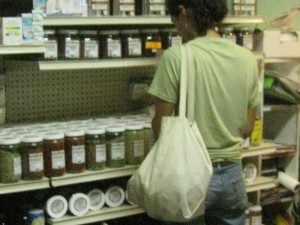
https://vimeo.com/20472305]

Typical grocery stores traditionally show their community loyalty by sponsoring a Little League baseball team or raising donations for a local hospital.
The Mariposa Food Co-op differs from typical grocers in the sense that they are the community.
The Mariposa Food Co-op, located in the Cedar Park neighborhood of Philadelphia at 47th Street and Baltimore Avenue, is owned and operated by members of the surrounding community. Members pay an initial membership fee to have access to the store in which they control what is sold by a democratic process comprised of a board of delegates and committees. Additionally, each member is required to work at the store two hours each month.
The goal of the co-op is for consumers to take control of what they eat by having a food selection that is relative to their needs and tastes, said education and development coordinator for Mariposa, Esteban Kelly.
The model of consumer-control best serves a diverse community like that of Cedar Park and the surrounding area. There is a large East and West African immigrant population that benefits from having foods from their native countries available to them.
“Those are things you should be able to access in your local community and not have to get packages delivered internationally to get the food you need on a daily basis,” said Kelly.

Dietary restrictions, such as those who are gluten-free, lactose intolerant, vegan or vegetarian, also play into the communal food system at Mariposa.
Kelly added that around 95 percent of the members come from the surrounding community, while others come from other parts of the city or out of town, including New Jersey.
Despite the requirements of fees and work, Mariposa does not benefit from the money and the free labor. The co-op then passes these capital investments off to the members in the form of cheaper food prices.
Even then, the money members invest into the co-op is treated as a capital investment, which they are given back if they decide to leave the co-op.
One of the benefits, said Kelly, of having a community-based grocery store is the ability for members to share information, recipes and cooking methods with fellow members.
Apart from the food aspect of the co-op, members are immersed in social gatherings hosted by Mariposa for members to interact with one another and build relationships.
Kelly credited the trend of supporting local, community-based, organic farmers as an impetus for the existence of co-ops like Mariposa, which has been serving the community since 1971. Some members have been shopping at Mariposa for decades.
When Mariposa started it was so small that it could not hire staff and therefore had to adopt the requirement of having members work in addition to paying an initial fee, said Kelly.
Now the co-op has over 1,000 members, with $1 million in annual gross sales, all operating in 500 square feet of retail space.
Kelly said the reason sales are high and the inventory turns over so quickly is because the co-op has a reliable base of shoppers, who, as members, provide ample feedback that ensures what is in the store is desired by the shoppers.
The co-op is planning an expansion that would increase its retail space to 3,000 square feet and would expand the idea of including non-members the ability to shop at the store.

While Mariposa grew to its current size by the hands of its members and the community, the same will be the case for its expansion into a new building a few blocks away between 48th and 49th streets on Baltimore Avenue. In raising the $2.2 million needed for the project, the co-op is seeking to raise $300,000 of it internally through a member loan campaign, which encourages members to take out private loans to lend to the co-op as capital. Kelly noted that one member loan was $10,000.
With the expansion, Mariposa will have to increase the initial membership fees from $100 to $200 but will do away with annual member dues of $40. As a way to assist those low-income members adjusting to the increased fees, the co-op will establish a fund to for scholarships that low-income members can then apply for.
The communal spirit of the board is emphasized through the democratic workings of its board of delegates and six committees. According to Kelly, the general membership has the ultimate authority over decisions made by committees, the board or employees. The board members are responsible with hiring and firing personnel and general day-to-day business.
Mariposa serves as a place where cultural, religious and generational varieties of community members meet to shop and work together, said Kelly.
“We’re a widely diverse group of people, the staff, the board, the membership, our shoppers on a day-to-day basis, are from pretty much all walks of life,” said Kelly.
.


how are you!This was a really splendid Topics!
I come from itlay, I was luck to find your Topics in baidu
Also I get much in your topic really thank your very much i will come every day